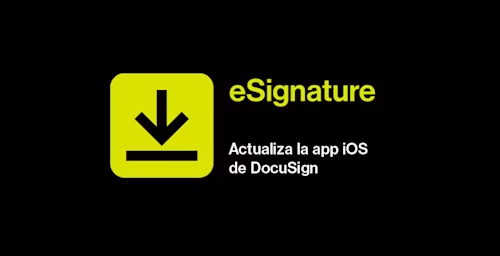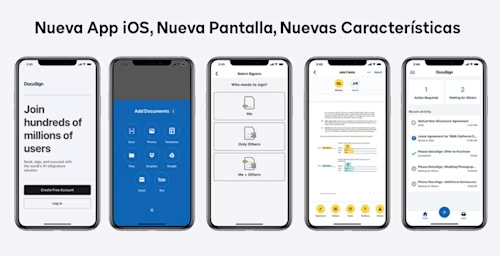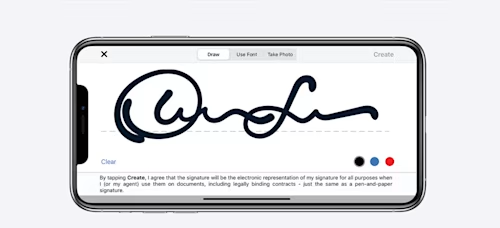
Firma electrónica más fácil: la nueva aplicación de Docusign para iOS
Nuestra aplicación de eSignature se ha rediseñado para mejorar la experiencia de usuario, con especial énfasis en la velocidad y la eficiencia.


Estamos entusiasmados con el lanzamiento de la nueva versión de nuestra aplicación móvil para iOS en la App Store. Nuestra aplicación de eSignature se ha rediseñado para mejorar la experiencia de usuario, con especial énfasis en la velocidad y la eficiencia para acelerar el proceso de hacer negocios y simplificar la vida de la gente.
Al desarrollar la nueva aplicación de Docusign, nos hemos centrado en el uso fácil, eliminando las complejidades como la sustitución manual de los campos etiquetados por funciones de etiquetado de arrastrar y soltar. La nueva aplicación ofrece a los usuarios las mismas herramientas y funcionalidades, pero eleva la experiencia general para permitir la firma y el envío de documentos sin problemas, en cualquier lugar y en cualquier momento.
¿Qué hay de nuevo en la aplicación de Docusign?
Al iniciar sesión en la aplicación de Docusign actualizada, vas a ver un nuevo aspecto que te permitirá mantenerse al tanto más fácilmente de los acuerdos que requieren tu firma, además de recordar o borrar los acuerdos que requieren tu atención. La interfaz actualizada es funcional y cómoda para cualquier usuario de Docusign, independientemente de su experiencia previa firmando y recogiendo firmas en el móvil.
Después de la actualización, vas a notar el nuevo icono de la aplicación y de la etiqueta de eSignature, que ahora es como un campo amarillo brillante de eSignature. A medida que Docusign se va definiendo como una empresa de Agreement Cloud, queremos que la aplicación para móviles también refleje eso.
Utilizar la aplicación móvil de Docusign para gestionar los acuerdos te mantiene actualizado sobre los estados de todos los acuerdos, independientemente de dónde se encuentre. La aplicación le ayudará a mantenerse al tanto de los acuerdos que requieren su acción o necesitan ser recordados. Completar y acelerar los acuerdos sin necesidad de acceder a la plataforma de escritorio de Docusign.

Envío paso a paso
Con el lanzamiento de la nueva aplicación hemos agilizado el proceso de recogida de firmas en un acuerdo de la aplicación móvil. Cargar un documento, asignar firmantes y enviar un acuerdo con la aplicación móvil de Docusign se ha vuelto más fácil. La aplicación ahora te guía a través del proceso paso a paso para enviar acuerdos, así que ya no puedes fallar a la hora de agregar a un destinatario como firmante o en copia.
Cargar y etiquetar de manera sencilla
Carga y agrega etiquetas en documentos directamente desde tu dispositivo móvil, ya sean archivos, fotos, plantillas y más. El etiquetado en el móvil se ha actualizado con una función de arrastrar y soltar que se usará al añadir campos a los documentos. Una vez que haya asignado firmantes al documento, etiqueta fácilmente el acuerdo a partir de gran variedad de etiquetas de arrastrar y soltar. Cada firmante tiene un color exclusivo para firmar el documento, así que puede saber fácilmente qué etiquetas se asignan a quiénes.
Plantillas
Hemos optimizado el uso de plantillas en el móvil para recopilar las firmas de acuerdos que envíes frecuentemente. Busca y utiliza una plantilla de forma fácil en la nueva aplicación móvil de Docusign para enviar acuerdos desde prácticamente cualquier lugar.
Perfil del firmante
Aumenta tu creatividad al máximo al configurar un perfil de firmante digital desde la aplicación. Crea tu firma electrónica exclusiva dibujándola, cargando tu firma manuscrita o eligiendo un estilo apropiado para seleccionar una firma. Configurar un perfil de firmante en el móvil nunca ha sido tan simple.

El próximo paso
Lanzamos la nueva aplicación para iOS, pero este es solo el comienzo. Nuestro objetivo es asegurarnos de que la aplicación es la compañera perfecta para tus necesidades de firma electrónica y no nos conformaremos con menos. Descarga la app gratis e sigue atento a nuestras novedades.
Publicaciones relacionadas
Docusign IAM: la plataforma de acuerdos que tu negocio necesita




